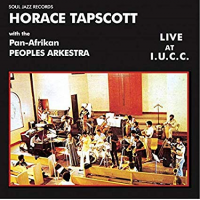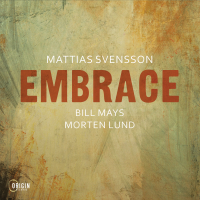Home » Jazz Musicians » Horace Tapscott
Horace Tapscott
Born in 1934 in Houston, Texas, Horace came from a musical family centered around his mother, Mary Malone Tapscott, who worked professionally as a singer and pianist. When Horace was nine, the family moved to Los Angeles. As a teenager in the late 1940's, Horace was surrounded by the music of Central Avenue: Art Tatum, Charlie Parker, Coleman Hawkins, Dexter Gordon, were among the many cats on the set. Around this time, Horace also began to take music lessons from teachers Dr. Samuel R. Browne and Lloyd Reese, whose other students included Eric Dolphy and Frank Morgan. Horace's musical studies included trombone in addition to piano.
In 1952, Horace graduated from Jefferson High, got married to Cecilia Payne and went into the Air Force. Horace played in an Air Force Band while he was stationed in Wyoming for his term of duty. After mustering out, he returned to Los Angeles where he worked around on various gigs until he joined the Lionel Hampton Big Band as a trombonist.
In 1959, Horace finally went with the Hampton Big Band to New York, where his friend Eric Dolphy introduced him to John Coltrane. A tough winter, a lack of gigs, and too many nights on the floor of a friend's art gallery finally sent Horace packing for sunny Southern California, where a life with wife and family awaited his return.
The sixties saw Horace emerge as a die-hard leader of the Avant Garde. Horace began to gain public notice playing with his own group, that included alto saxophonist Arthur Blythe, bassist David Bryant, and drummer Everett Brown II. Horace also appeared on records for the first time (see discography).
Horace was always outspoken about racism, politics, stereotypes, and social ethics. His forward- minded vocal presence on and off the microphone is as much a part of his art as his piano playing. As a result, he was labeled a "dissident," categorized as an "employment risk," and black-listed from the music industry establishment in the early 1970's. None of this slowed Horace down. He began gigging sporadically at Parks and Recreation events and for churches around Watts. This "dark period," with his only regular gig at his friend Doug Weston's Troubadour on Los Angeles' "Restaurant Row", was also a time of intense creativity.
Around 1977, Horace reorganized the Pan-Afrikan Peoples Arkestra with the help of several old friends and many new faces. The Arkestra performances involve singing, dancing, and poetry in addition to the music. Soon after the new group's debut, Horace came to the attention of producer Tom Albach who contracted Horace to record a number of albums for Nimbus Records (see discography). Albach also helped introduce Horace to an international audience by arranging several European tours.
Read moreTags
Horace Tapscott, Smiley Winters, and Blue Stars of France

by Jerome Wilson
This is a vintage episode first heard on January 19, 2021. The cast for this show includes Horace Tapscott, Smiley Winters. Marc Ribot, Marion Brown, and the Blue Stars of France. Playlist Henry Threadgill Sextet “I Can't Wait Till I Get Home" from The Complete Novus & Columbia Recordings of Henry Threadgill & Air (Mosaic) 00:00 Eddie Hazell “Watch What Happens" from One For My Baby (Eden) 1:14 Blue Stars of France “Lullaby of Birdland" from Lullaby of ...
Continue ReadingHorace Tapscott: 60 Years

by Danen Jobe
In the world of the Pan-Afrikan Peoples Arkestra, it is impossible to separate community and music. The band is all from the South Central LA community, and they are playing for the community. They are composing songs about family, about people they see, about overcoming immense adversity. There is a distinct sound to this band, which first and foremost is the sound of its founder and leader, Horace Tapscott. It is deep, often accompanied by two or three ...
Continue ReadingPan Afrikan Peoples Arkestra: 60 Years

by Chris May
The 2 x LP 60 Years celebrates the history of the Pan Afrikan Peoples Arkestra (PAPA), which was founded by the pianist, composer and community activist Horace Tapscott in South Central Los Angeles in 1961, and directed by him until he passed in 1999. The release, albeit of archive material, also reminds us that the Arkestra remains active in 2023, now under the direction of drummer Mekala Session, son of the Arkestra's veteran alto saxophonist Michael Session. There are six ...
Continue ReadingPan-Afrikan Peoples Arkestra: Live at I.U.C.C. 11/26/1978

by Danen Jobe
In November of 1978, Horace Tapscott had some advantages that any other iconoclastic, idealistic, idiosyncratic jazz bandleader would greatly desire. For one, he was approached by a socially minded professional gambler named Tom Albach about starting a label (Nimbus West) devoted to Tapscott's music, allowing complete creative control, never expecting to make a dime of profit, and providing living money to keep the band going. Another was a steady gig in the only area in the nation that Tapscott truly ...
Continue ReadingA World of Piano

by Jerome Wilson
This is two hours of piano played by icons including Thelonious Monk and Cecil Taylor, overlooked figures Hasaan Ibn Ali and Horace Tapscott, and current stars Brad Mehldau and Fred Hersch. Playlist Henry Threadgill Sextett “I Can't Wait Till I Get Home" from The Complete Novus & Columbia Recordings of Henry Threadgill & Air (Mosaic) 00:00 Juliet Kurtzman/Pete Malinverni “Davenport Blues" from Candlelight: Love in the Time of Cholera (Saranac) 1:05 The Thelonious Monk Orchestra “Crepuscule With Nellie" ...
Continue ReadingHorace Tapscott Quintet: Legacies for Our Grandchildren: Live in Hollywood 1995

by Karl Ackermann
Since its founding in 2011, the French record label Dark Tree has been issuing a “Roots Series" documenting previously unreleased performances of the Los Angeles jazz avant-garde from the 1970s through the '90s. Among the best of those releases have been several from Pan Afrikan Peoples Arkestra led by pianist/composer/conductor Horace Tapscott. Legacies for Our Grandchildren: Live in Hollywood 1995 is one of only two quintet albums led by the pianist. A community activist in South Central LA, Tapscott often ...
Continue ReadingRoberto Miranda's Home Music Ensemble: Live at the Bing Theater; Los Angeles, 1985

by Karl Ackermann
Roberto Miranda has appeared on almost one-hundred albums but has been lightly recorded as a leader, and inexplicably struggled to generate interest among labels. Dark Tree Records has released some great Horace Tapscott performances from the '70s and '80s. The label resurrected a Miranda-led session on Live at the Bing Theater; Los Angeles, 1985. Recorded at the USC campus auditorium, the sound is pristine, and the ambiance, eclectic and dynamic. Miranda studied bass with Ray Brown and Red ...
Continue ReadingHorace Tapscott: "The Dark Tree" on Hatology 2-630

Source:
Michael Ricci
Horace Tapscott The Dark Tree hatOLOGY 2-630 Horace Tapscott –piano John Carter – clarinet Cecil McBee – double bass Andrew Cyrill – drums
Recorded live in Hollywood on December 14-17, 1989. This was an important, revealing release when it was first issued in 1991. Now, with both Horace Tapscott and John Carter having passed on, it takes on even more significance with our knowing that they are beyond the vagaries ...
read more
































